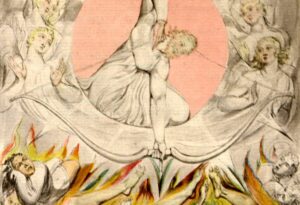The BEST: Paradise Lost

Summary: In John Milton’s “Paradise Lost”—the revised edition of which he published in 1674—the then blind author transforms the content of 80 biblical verses into 10,565 lines of non-rhyming iambic pentameter. Feeding off Rabbinic exegesis, Greek epic, and Christian tradition, Milton dramatizes Satan’s scheme to stain humanity with sin.
The poem begins in Hell with Satan waking on a lake of black fire. Having lost the battle for Heaven against God, he stirs and rallies his fellow fallen angels who, in response, erect a palace they call Pandemonium (“all demons”) to host a debate on the subject of how to avenge their defeat. Eventually admitting God’s unassailable power, the devils settle on a conspiracy to seduce His newest, and now most cherished, creature.
Milton goes on to trace Satan’s path as he, alone, climbs out of hell, flies through chaos, disguises himself, and lies to an angel who permits him to land on Earth and enter Paradise. In Eden, Satan sees the first couple and finds their love to be a source of searing envy, which deepens his, at once ambivalent and inexorable, resolve to lead them to ruin.
In response, Heaven sends the angel Raphael as an emissary to warn Adam and Eve of the potency of evil and the capacity for humanity to choose good. He delivers a message of vigilance and obedience and confidence through the medium of a cautionary tale—disclosing the details of the seditious war launched by recalcitrant angels who ultimately fell. Yet, when Satan possesses a snake to persuade Eve to eat from the forbidden tree, both she and Adam breach the only prohibition that they received. In failing they fall and find themselves expelled from Eden.
The final lines of the poem insinuate a path forward for our first parents, suggesting that even as Paradise is lost, redemption remains ever possible.
 Why this is The BEST? I am far from the first to suggest that “Paradise Lost” lies among “the best that has been thought and said,” for Milton himself makes the claim. In speaking of the inspiration that he drew from the divine muse in producing a unique blend of Greek epic and Biblical truth, he notes that he has pursued “Things unattempted yet in Prose or Rhime.”
Why this is The BEST? I am far from the first to suggest that “Paradise Lost” lies among “the best that has been thought and said,” for Milton himself makes the claim. In speaking of the inspiration that he drew from the divine muse in producing a unique blend of Greek epic and Biblical truth, he notes that he has pursued “Things unattempted yet in Prose or Rhime.”
But there is more to Milton’s poem than the technical brilliance of its original and inimitable poetics. He deliberately redefines and revolutionizes the very genre of epic poetry.
All of his poetic predecessors, from classical Greece to Spenserian Britain, use words to paint pictures that celebrate war. But, for Milton, war is simply unworthy. Despite his strenuous defense of regicide and his vindication of a parliamentary rebellion, he sees war as occasionally necessary, but rarely the province of nobility. Myths of monumental conflicts and tales of fights and feasts and steeds and knights are, in Milton’s words, “Not that which justly gives Heroic name to Person or to Poem.”
For Milton, true virtue is found not in the defeat of others but in the mastery of the self, not in armed conflict but in contesting temptation, in what he calls “the better fortitude of Patience.” And this alone is the proper subject of epic poetry. In book after book of “Paradise Lost’s” twelve tomes, Milton dismantles the celebration of mortal combat so paradigmatic of Homer and Virgil—depicting belligerence as the blemish of the weak, and resilience as the sign of the strong.
Milton is the first, and in some ways the greatest, to turn the genre on its head, in ways that make his work not just brilliant or “the best,” but deeply biblical—and not simply as a consequence of its cast. As R. Jonathan Sacks argues, in his Not in God’s Name, the dualistic traditions of Greece and Persia bequeathed humanity a model of heroism rooted in defeating a foreign enemy, but “Monotheism internalizes what dualism externalizes.” For him, Judaism’s most important moral contribution to the West is “not the clash of titans on the field of battle, but the quiet inner drama of choice and will, restraint and responsibility.” And it is precisely this contribution that Milton absorbs, along with his Puritan peers, and sets at the epicenter of his poem.
Ultimately, “Paradise Lost” stands as a testament to the capacity of a blind poet to depict a vision of the moral universe at the core of the human condition. A vision that invites us to foster techniques for self-correction and deflect temptation in favor of reflection; a vision that asks us to see the peak of our power not in acts of conquest but in the capacity to choose.
Dov Lerner serves as the Rabbi of the Young Israel of Jamaica Estates and a member of the faculty at Yeshiva University’s Straus Center for Torah and Western Thought. Click here to read about “The BEST” and to see the index of all columns in this series.
